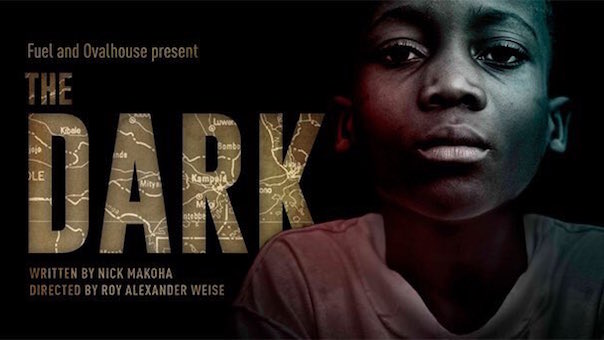Refugee. Asylum seeker. Immigrant. Words with distinctive meanings which are often lumped together in confusion, ignorance and hatred to describe “The Other”.
A term used by poet-turned-playwright Nick Makoha in the programme notes of his autobiographical two-hander The Dark to describe the reception he faced in the UK at the hands of a toe-curlingly patronising official after his mother smuggled him out of Idi Amin’s brutal dictatorship in Uganda courtesy of a hair-raising ride on a rickety matatu.
If Carlsberg did minibuses, this was not one of them.
Told with great skill, versatility and grace by performers Michael Balogun and Akiya Henry who in addition to playing wide-eyed Nick and his saintly Mother flit between multiple characters at the drop of a bribe to a gun-toting soldier, director Roy Alexander Weise succeeds in realising Nick Makoha’s aim “to put a face to the polarising words of refugee and immigrant.”
Many of the scenes are fleeting. And the dialogue, though bursting with violence and vivid imagery (the sound of a tortured victim likened to “a live chicken being skinned”), is often narrative-driven. The result of which is that the emotions are rarely engaged.
Furthermore, the clunking slides and grainy projections add little to Rajha Shakiry’s appropriately ramshackle set of movable bus seats under a roof of battered suitcases which towards the end illuminates with the blinding light of officialdom.
But where the creative team, together with lighting designer Neill Brinkworth and sound designer Duramaney Kamara, really grab our attention is when opposing forces meet eye to eye and charge the confined space with life-or-death tension. None more so than when a boy soldier “with a river of AIDS running through his veins” points a gun at Nick’s startled mother.
A powerful piece of storytelling about those who share what little they have, while those in power gorge on money like locusts.
- REVIEW: Orphans @ Edinburgh King’s Theatre
- 13th April 2022
- REVIEW: Everybody’s Talking About Jamie @ Edinburgh Festival Theatre
- 30th March 2022
- REVIEW: Sheila’s Island @ Edinburgh King’s Theatre - 2nd March 2022












by Johnny Owens
With The Dark, Nick Mahoa tells an intensely personal story about growing up in – and escaping from – what was one of the most brutal and wicked regimes in history. Most of us spend our days complaining about ‘problems’ that are, in the grand scheme of things, utterly inconsequential. This is one of a number of reasons why The Dark feels like a story that very much needs to be told – both for the audience and for Mahoa himself – and that’s also why it’s so frustrating that so many of its elements simply don’t gel in the way they should.
I’ve never had an issue with actors playing multiple roles in plays. It’s a tried and true technique that can be used to great effect – Angels in America being a prime example. When it’s done well. Unfortunately this isn’t the case with much of The Dark. Michael Balogun and Akiya Henry – both of whom are phenomenal – a switch roles with such machine gun rapidity that much of the first half is spent simply trying to keep up with who’s who and how they’re relevant to the narrative. This is also a problem because – once you’ve clocked each character’s significance – you realise that all of these characters are, in fact, indispensable. As a result, I was often left thinking that The Dark would have benefited from a much larger cast.
This leads me to another problem, which is that of Michael Balogun’s narration. Monologue is in no way a deal breaker for me either – I mean, that would be ridiculous – and in The Dark it feels wholly necessary – again, this is an incredibly personal story and this context is required in order to consolidate the personal with the historical. However, due to the aforementioned sardine tin of characters, the narration is left feeling like clunky exposition rather than poignant reflection, and you’re often left with the impression that Mahoa somehow knew just how confusing the early scenes of the play were.
This isn’t to say that The Dark isn’t without its merits. Some of the productions best moments are its most human and, ironically, these are also the most striking reminders of the horror these people lived through day-to-day. The moments when characters joke amongst themselves or discuss not the constant threat of death that looms over them but rather the minutiae of everyday life, these are the moments that remind you of just how devastating this period in Ugandan history truly was. You wonder if they actively choose not to discuss their state of affairs so as to somehow lessen the trauma, or if it isn’t even given a second thought. Has it just become the norm and no longer demands discussion? And which of those is more upsetting?
The most frustrating thing about The Dark is that it is in no way a bad play. It has so much potential, especially in its latter half and is so painfully relevant, despite being set forty years in the past. In particular, the final scene will leave you gritting your teeth with a fresh hatred for a broken system that doesn’t seem to have improved one iota in four decades. It really is a shame that such a potentially powerful piece of work is bogged down so much by its own ambition.